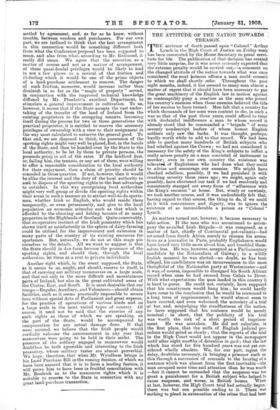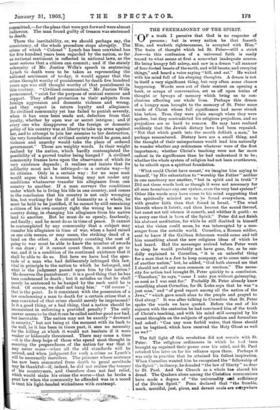FHE ATTITUDE OF THE NATION TOWARDS , TREASON.
THE sentence of death passed upon " Colonel!' Arthur. Lynch in the High Court of Justice on Friday week. has been commuted by the Home Secretary to penal servi., tude for life. The publication of that decision has created very, little surprise, for it was never seriously expected that the extreme penalty would be carried out,—a comment on the changed attitude of the nation towards what was oncis considered the most heinous offence a man could commit to which we shall shortly refer. Throughout the past: eight months, indeed, it has seemed to many men almost a matter of regret that it should have been necessary to reit the great machinery of the English law in motion against so contemptibly puny a creature as the man who -joined. his country's enemies when those enemies believed the tide of her success to have turned. Men felt that a country for which thousands of her sons were content to die, in such a war as that of the past three years, could afford to treat' with disdainful indifference a man to whose record- it already stood that he commanded a " brigade" of some seventy nondescript loafers of whom honest English, soldiers only saw the backs. It was thought, perhaps,- hardly worth while to add to that record. We had been able to pardon many hundreds of British subjects who had rebelled against the Crown;. we had not considered 'it necessary for the safety of theKing's subjects to inflict a really severe penalty on a man convicted of incitement- to murder; even in our own country the existence was tolerated. of Englishmen who had done what they, could to advise and encourage our enemies. We might have checked rebellion, possibly, if we had punished it with crushing severity three years ago ; we might, again only possibly, have shortened our task if we had resolutely and consistently stamped out every form of "adherence with the King's enemies" at home. But, wisely or unwisely,. WA took another course, and it was undoubtedly felt that, having regard to that course, the thing to do, if we could do it with convenience and dignity, was to ignore the existence of so inconsiderable a person as " Colonel " Lynch.
As matters turned out, however, it became necessary to take action. If the man who was accustomed to accom- pany the so-called Irish Brigade—it was composed, as a matter of fact, chiefly of Continental pot-valiants—had returned from South Africa merely to resume his avoca- tions as a journalist in Paris, probably Englishmen would have beard very little more about him, and troubled them- selves less. He was, however, accepted as a Parliamentary candidate by the Nationalists of Galway; in a wildly foolish moment he was elected—no doubt, as has been alleged, his candidature was an inconvenience to the more thoughtful of the Nationalist party at Westminster—and it was, of course, impossible to disregard his South African record when once be had crossed from Calais to Dover. With what expectations the man landed in this country it is bard to guess. He could not, certainly, have supposed that his countrymen would hang him ; he could' hardly, have come to the conclusion that he would be sentenced to a long term of imprisonment; he would almost Seem to have courted, and even welcomed, the notoriety of a trial at bar, and, misjudging the steadfastness of the nation, to, have supposed that his sentence would be merely nominal ; in short, that the publicity of his trial was worth the risk of a short period of imprison- ment. He was mistaken. He did not calculate, in the first place, that the mills of English judicial pro- cedure would grind so slowly ; that the reports of the trial in the High Court would not appear in the newspapers • until after eight months of detention in gaol ; that the law which has stood for five hundred years was not yet con- sidered wholly obsolete. We, for our part, regret the delay, doubtless necessary, in bringing a prisoner such as this through a succession of remands to the hearing of a sentence which was almost from the first inevitable—the man occupied more time and attention than he was worth —but it cannot be contended that the suspense was too great a punishment for a British subject who helped to cause suspense, and worse, in British homes. When - at last, however, the High Court trial had actually begun,' there was but one possible ending to it. There was nothing to plead in extenuation of the crime that had been committed,—for the pleas that were put forward were almost ludicrous. The man found guilty of treason was sentenced to death: There the inevitability, or, we should perhaps say, the consistency, of the whole procedure stops abruptly. The crime of which " Colonel ' Lynch has been convicted has for five hundred years been regarded by the nation, so far as .national sentiment is reflected in national laws, as the most serious that a citizen can commit; and if the stately solemnity of Mr. Justice Wills's speech in sentencing Lynch to death were to be taken as representing the national sentiment of to-day, it would appear that the crime thought worthy of punishment by death five hundred years ago was still thought worthy of that punishment in this. ceaury. "Civilised communities," Mr. Justice Wills pronounced, "exist for the purpose of mutual succour and support. They afford protection to their subjects from foreign aggression and domestic violence and wrong, and they expect in return loyalty and allegiance. No civilised community yet has failed to punish severely, when it has once been made out, defection from that loyalty, whether by open war or secret intrigue ; and if every one who disapproves of the foreign or domestic policy of his country was at liberty to take up arms against her, and to attempt to join her enemies to her destruction, the very foundations of civilised society would be gone, and violence and anarchy would take the place of ordered government." Those are weighty words. Is their weight realised by the nation, which hardly contemplated the possibility of a proved traitor being hanged ? A civilised community frames laws upon the observance of which its very existence depends ; it realises and insists that its solidarity must not be infringed—in a certain way—by its citizens. Only in a certain way : for no sane man would argue that a human being may not under any conditions whatsoever transfer his allegiance from one country to another. If a man surveys the conditions under which he is living his life in one country, and comes to the conclusion that his country is not only wronging him,-butmorking for the ill of humanity as a whole, he must be held to be justified, if he cannot by still remaining a citizen of his own country right the wrong he sees his country doing, in changing his allegiance from his native land to another. But he must do so openly, fearlessly, and finally; and he must do so in time of peace. It cannot be contemplated by any community that a subject may transfer his allegiance in time of war, when a hand raised on one side means, or may mean, the striking dead of a hand on the other. A community counting the cost of going to war must be able to know the number of swords it can draw ; if it cannot count them, it cannot go to war, audit is a condition of its continued existence that it shall be able to do so. But here we have had the spec- tacle of a man who had deliberately infringed this law, vital in principle to the nation to which he belonged, and what is the judgment passed upon him by the nation ? 'He deserves the punishment ; it is a good thing that he has been condemned to death ; but it satisfies us that he shall merely be sentenced to be hanged by the neck until he is dead. Of course, we shall not hang him.' "Of course " ; that is the point. Is it consistent with the possession of a law condemning a man to death for a certain crime that a man convicted of that crime should merely be imprisoned? Is it a good thing, or a bad thing, that a nation should be inconsistent in enforcing a provided penalty ? The only answer seems to be that it can be called neither good nor bad, but inevitable. The nation may not be exactly "drowned in security," but not being at the moment with its back to the wall, as it has been in times past, it sees no necessity for the killing at which it would not hesitate if it were weaker or hideously threatened. There may come a time it is the deep hope of those who spend most thought in ensuring the preparedness of the nation for war that it may never come—when all the old standards will be revived, and When judgment for such a crime as Lynch's will be necessarily merciless. The prisoner whose sentence has now been commuted from death to penal servitude flay be thankful—if, indeed, he did not realise the temper of his countrymen, and therefore does not feel relief, Which would make his crime the worse—that he broke a great law when-the community he offended was in a mood to treat his light-headed wickedness with contempt.























































 Previous page
Previous page